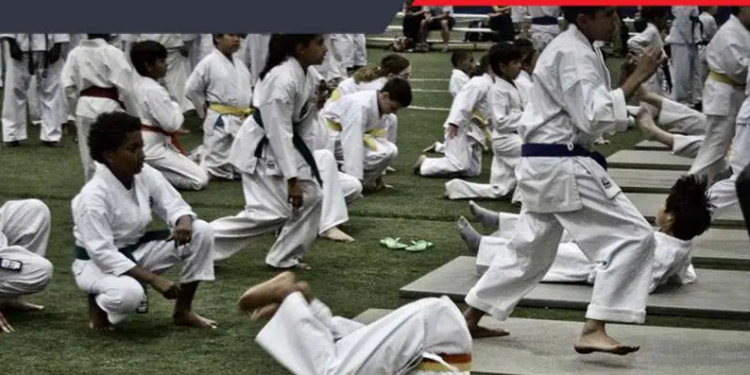Every parent’s top goal is to support their child’s development and well-being in a world full of diversions and difficulties. Martial arts are one of the most radically influential and life-changing gift ideas available for children. Martial arts are an amazing gift for kids because they combine mental clarity, physical exercise, and emotional growth. We’ll examine the strong arguments for why teaching your child martial arts is an investment in their overall development and progress rather than only a gift in this investigation. Discovering the incomparable advantages that make martial arts for youngsters a lifelong gift.
Physical Fitness and Health Benefits
Kids martial arts are more than just physical training. They help children get stronger, more agile, more flexible, and more coordinated. This encourages an active lifestyle, which is essential in the fight against childhood obesity. This is a summary of the advantages of kids’ martial arts for physical fitness and health:
1. Enhanced Physical Strength and Conditioning
Kids’ martial arts incorporate a variety of methods and exercises that strengthen muscles, increase stamina, and improve general physical health.
2. Improved Flexibility and Coordination
Children who train in martial arts become more flexible through stretches and motions, which also improves their coordination and agility.
3. Promotion of an Active Lifestyle
Martial arts help kids lead active lifestyles and fight sedentary behavior by encouraging frequent physical activity.
4. Cardiovascular Health and Stamina
Children who practice martial arts have better cardiovascular health as well as more endurance and stamina.
5. Weight Management and Body Awareness
Frequent practice helps kids maintain a healthy weight and improves their posture and body awareness.
Kids’ martial arts instruction offers various approaches to physical training and several advantages that improve kids’ general health and well-being.
Mental and Emotional Well-being
Children who practice martial arts gain confidence, self-control, discipline, and self-worth. In addition to relieving tension, these exercises sharpen mental focus, two qualities that are essential in the demanding world of today. These are a few brief points highlighting the advantages kids’ martial arts provide for their mental and emotional health:
1. Development of Discipline and Focus
Children who participate in martial arts learn discipline, focus, and concentration, which enhances their mental acuity and attention span.
2. Boost in Self-Confidence and Self-Esteem
Advancements in martial arts methods and training accomplishments contribute to children’s increased self-assurance and self-worth.
3. Stress Reduction and Improved Mental Resilience
Kids who practice martial arts learn how to regulate their stress and develop mental toughness, which helps them deal with life’s obstacles.
4. Enhanced Emotional Control and Regulation
Children who receive martial arts instruction learn how to properly control and regulate their emotions.
5. Building Character and Respect
Martial arts training instills values like respect, integrity, and humility, which positively shape children’s social relationships and character.
Learning Important Life Skills
Martial arts promote essential qualities such as respect, responsibility, and perseverance. Additionally, these subjects help youngsters develop their leadership and conflict-resolution abilities, which helps them become well-rounded people.
Social Development and Interaction
Beyond formal training, social development and connection are essential. It’s not just about teaching kids how to kick and punch; it’s also about building their sense of belonging and vital social skills. Martial arts academies give children a platform to create friendships, learn teamwork, and develop critical social skills through organized classes and shared experiences.
Enhanced Self-Defense Skills and Safety
The ability to defend oneself is a major benefit of martial arts training. Children acquire confidence in managing difficult circumstances as they learn about personal safety and awareness.
Tailored Programs for Different Age Groups
Kids martial arts schools customize their curriculum to meet the individual needs and stages of each age group, guaranteeing that they receive teaching that is appropriate for their mental, emotional, and physical development. With a supportive environment catered to their requirements, this approach helps children learn and grow productively.
1. Preschoolers (Ages 3-5)
- A lighthearted introduction to fundamental martial arts techniques.
- Through enjoyable exercises, concentrate on improving motor skills, coordination, and discipline.
2. Elementary School-Aged Children (Ages 6-12)
- Organized lessons that gradually teach students martial arts skills.
- Emphasis on virtues like self-control, discipline, and respect in addition to physical training.
3. Teenagers (Ages 13-18)
- Proficient martial arts instruction emphasizing intricate methods and physical stamina.
- Connections for more profound character development and leadership growth.
Overcoming Challenges and Building Resilience
The martial arts teaches children the importance of mistakes and losses in promoting personal development. Children acquire resilience, tenacity, and the ability to overcome challenges through these disciplines.
Addressing Common Misconceptions
Myths about martial arts for children that involve anger and safety issues are dispelled. It is made clearer how martial arts instruction is comprehensive, emphasizing discipline and self-improvement.
Conclusion
In conclusion, kids’ martial arts are a fantastic present for children because of their many benefits. Beyond only improving physical health, martial arts teach children self-control, self-assurance, social skills, and resilience—among other critical life skills. In addition to making them physically skilled people, this life-changing experience strengthens their mental toughness, emotional equilibrium, and sense of belonging. Martial arts are a priceless investment in children’s general well-being because they provide a comprehensive approach to growth and development that equips them to tackle life’s obstacles with grace, confidence, and resilience.


 Home
Home









